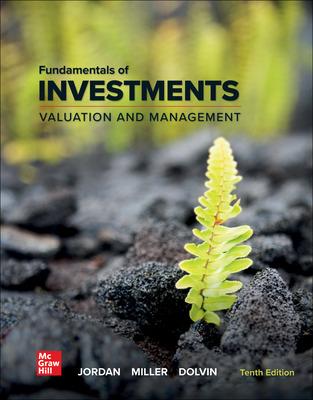Suzanne Harlan has a large, well-diversified stock and bond portfolio. She wants to try some alternative investments,
Question:
Suzanne Harlan has a large, well-diversified stock and bond portfolio. She wants to try some alternative investments, such as hedge funds, and has contacted Lawrence Phillips, CFA, to help assemble a new portfolio.
Before agreeing to make recommendations for Ms. Harlan, Mr. Phillips wants to determine if she is a good candidate for alternative investments. He gives her a standard questionnaire. Here are some of her comments:
• I’m interested in high returns. I’m not afraid of risk, and I’m investing money for the benefit of my heirs.
• I pay a lot of attention to expense and return data from my investments and track their performance closely.
• Investors have told me that assessing the quality of hedge funds is difficult, so I’m interested in purchasing a fund of funds where I can diversify my risk while potentially sharing in some outsized returns.
• I pay several million dollars in taxes every year, and I want any additional investments to be tax-friendly.
• My neighbors founded Kelly Tool and Die 20 years ago. They are declaring bankruptcy, and I am interested in obtaining a partial interest in the business.
Ms. Harlan then tells Mr. Phillips that it is imperative that the returns of any investments he recommends must be in some way comparable to a benchmark.
Mr. Phillips is not excited about the business idea or the fund of funds. However, he does know of several managers of individual hedge funds. He talks her out of a fund of funds and suggests she put her money in the Stillman Fund, which concentrates on spin-offs, generally buying the spun-off company and shorting the parent company.
1. In an attempt to talk Ms. Harlan out of investing in a fund of funds, Mr. Phillips addressed the advantages of investing in individual funds. Which of the following would be his most compelling argument?
a. The lower expenses of individual funds
b. The likelihood of style drift in a fund of funds
c. The lack of a benchmark for a fund of funds
2. What investment approach would be consistent with Ms. Harlan’s tolerance for risk?
a. Distressed security
b. Arbitrage
c. Market neutral
3. Which of Ms. Harlan’s responses is most likely to make Mr. Phillips consider her a bad candidate for investing in hedge funds?
a. I pay a lot of attention to expense and return data from my investments and track their performance closely.
b. I pay several million dollars in taxes every year, and I want any additional investments to be tax-friendly.
c. I’m interested in high returns. I’m not afraid of risk, and I’m investing money for the benefit of my heirs.
4. If Ms. Harlan is truly concerned about benchmarks, she should avoid which of her suggested investments?
a. None of them
b. Kelly Tool and Die
c. Hedge funds.
Step by Step Answer:

Fundamentals Of Investments Valuation And Management
ISBN: 9781266824012
10th Edition
Authors: Bradford Jordan, Thomas Miller, Steve Dolvin





